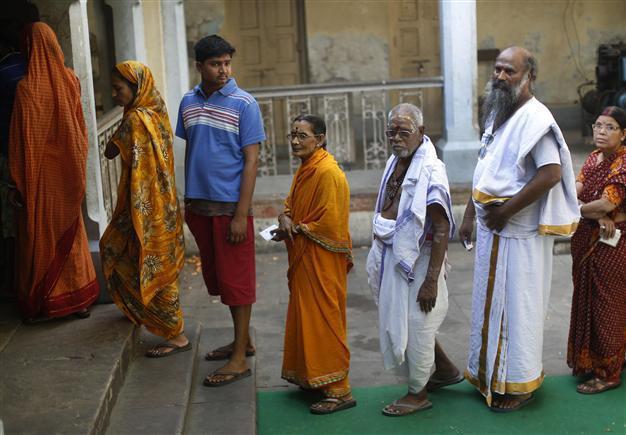Record India election ends, exit polls favour Modi
NEW DELHI - Agence Presse France

People wait to cast their vote at a polling station in the final phase of the general election in Varanasi in the northern Indian state of Uttar Pradesh May 12, 2014. REUTERS Photo
Indians cast final ballots Monday in a record election that saw 551 million people vote over five weeks, with exit polls predicting a new right-wing government under hardliner Narendra Modi.
The final phase of voting in 41 constituencies ended at 6:00 pm (1230 GMT), with the first exit polls released soon afterwards pointing to a huge swing towards Modi's Bharatiya Janata Party (BJP).
The survey results backed forecasts before voting started on April 7 that the BJP -- and its allies -- should be able to reach a majority in parliament after trouncing the ruling Congress party.
But as the stock market hit a new record high on hopes that Modi can jumpstart the flagging economy, analysts urged caution due to notorious forecasting failures in 2004 and 2009.
The first full survey from CVoter showed the BJP and its allies reaching a majority, while others released by the CNN-IBN and Headlines Today channels showed a rout for Congress in many states.
Shortly after polls closed for the last time, the Election Commission gave final figures for the world's biggest election, saying 551 million had voted -- 130 million more than in 2009 -- with turnout also at a record high of 66.38 percent.
"These numbers may still go up marginally because of postal ballots and other factors," director general of the Election Commission, Akshay Rout, told reporters.
Official results are due on Friday.
Attention earlier in the day had focused on the sacred city of Varanasi where 63-year-old Modi was standing as a candidate and hoping for a crowning victory on the final day of voting.
In a video message, he paid tribute to the hundreds of thousands who "stood out in the scorching sun for hours to give strength to our democracy" over the last five weeks.
He also praised Varanasi for "its peace, its goodwill and its unity".
His decision to stand in Varanasi was rich in religious symbolism and seen as reinforcing his Hindu nationalist credentials during a campaign in which he steered clear of his customary hardline rhetoric.
The four-times chief minister of the western state of Gujarat has campaigned on a pledge of clean government and development to revive the flagging economy after 10 years of left-leaning rule by the Congress party.
But he remains a deeply polarising figure over allegations that he failed swiftly to curb deadly 2002 anti-Muslim riots in Gujarat which left at least 1,000 people dead shortly after he came to power there.
"I have voted for the about-to-be PM of India, Narendra Modi," 35-year-old Setupati Tripathi told AFP after casting his ballot in the city, where Hindus are cremated on the banks of the holy River Ganges.
"With him winning the Varanasi seat, I am also confident about the development of this millennia-old city as a tourist destination," he added as bearded holy men dressed in saffron robes queued elsewhere to cast their votes.
Anti-corruption champion Arvind Kejriwal from the new Aam Aadmi (Common Man) Party was also contesting and hoping to upset Modi, who has spent little time in the city as he campaigned across the country.
Varanasi, around 420 miles (680 kilometres) east of Delhi, has a large Muslim population which would be expected to vote against Modi.
"The way things have been shaping up in the last three days, everybody is saying Modi is losing," Kejriwal, who has focused on a grassroots campaign, told reporters.
Opinion polls show voters have turned against Congress over massive graft scandals, spiralling inflation and a sharp economic slowdown in the last two years.
Despite a decade of economic growth that has averaged 7.6 percent per year, a sharp slowdown since 2012 has badly hurt the party, run by the Nehru-Gandhi dynasty which has dominated post-independence politics in India.
The latest member of the famous bloodline, Rahul Gandhi, who is leading his first national campaign, has denied that the party is staring at almost certain defeat.
Modi, the son of a tea-stall owner who rose through the BJP ranks, has derided his opponent as a reluctant "shehzada" (prince) and Gandhi's lacklustre campaign has latterly been overshadowed by his sister Priyanka's electioneering.
The Gandhi siblings, joined by their mother and party president Sonia, have hit back, accusing Modi of being dangerously divisive and prejudiced against the country's 150 million Muslims.
Congress spokesman Shakeel Ahmed stressed that opinion polls had failed to predict a victory for his party and its allies in 2004, when they ousted a BJP-led coalition, and in 2009.
"We anticipate that we will be able to attain a majority with our alliance partners, but all calls will be taken by (the) party after final results are announced," he told a press conference in New Delhi.
